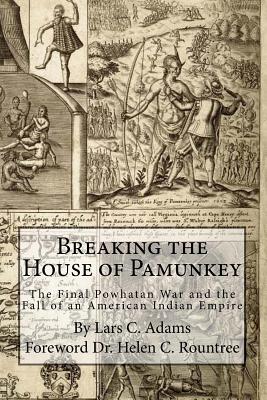Breaking the House of Pamunkey: The Final Powhatan War and the Fall of an American and Indian Empire

Breaking the House of Pamunkey: The Final Powhatan War and the Fall of an American and Indian Empire
Most have heard of the story of Jamestown. Pocahontas saves John Smith and the rest of the colony from starvation in a romantic bedtime story. But there is a version not often told. A story of extreme violence and retribution as Pocahontas's uncle rose to power among the Powhatan people and led his people in the deadliest assault ever carried out by an indigenous group against a European settlement, before or since. It is a story of revenge and genocide. This is the story of the Powhatan War of 1644. Most studies focusing on this Third Anglo-Powhatan War have been no longer than two paragraphs in length, about the size of an encyclopedia entry. Read as an epitaph of the Powhatan people rather than as a turning point, the Powhatan Nations usually fade from the view of history following this poorly understood war. In the world's first book-length study of the Third Anglo-Powhatan War, award winning historian Lars C. Adams brings forth new documentation and greater detail than ever before, illuminating a lost chapter in North American history. To indigenous people in Virginia whose present reservations and land bases stem directly from the ultimate results of this war, this narrative challenges the popular notion that Pocahontas's people invited the newcomers with open arms. The message they sent was clear. You are no longer welcome in our land. In a stunning series of raids, Opechancano, though elderly and unable to stand, led his people to a major victory on April 18, 1644, by suddenly attacking the Virginian frontier, killing up to 500 settlers and cutting off isolated garrisons from supplies. All of Virginia was now under siege a time when mainland England was locked in a civil war and was unable to assist the struggling colony. Though Virginia successfully countered the assault, they expended the last of their ammunition in the effort, giving the Powhatans a chance to press the advantage. It was not until Virginia was forced to purchase supplies from the anti-crown faction in England that the tide would be turned in Virginia's favor. Opechancano would be captured, jailed, and shot in the back by his guard. His people, however, would survive. And though their troubles were far from over, continue to this day to be an active and thriving indigenous people.
PRP: 201.42 Lei
Acesta este Pretul Recomandat de Producator. Pretul de vanzare al produsului este afisat mai jos.
181.28Lei
181.28Lei
201.42 LeiLivrare in 2-4 saptamani
Descrierea produsului
Most have heard of the story of Jamestown. Pocahontas saves John Smith and the rest of the colony from starvation in a romantic bedtime story. But there is a version not often told. A story of extreme violence and retribution as Pocahontas's uncle rose to power among the Powhatan people and led his people in the deadliest assault ever carried out by an indigenous group against a European settlement, before or since. It is a story of revenge and genocide. This is the story of the Powhatan War of 1644. Most studies focusing on this Third Anglo-Powhatan War have been no longer than two paragraphs in length, about the size of an encyclopedia entry. Read as an epitaph of the Powhatan people rather than as a turning point, the Powhatan Nations usually fade from the view of history following this poorly understood war. In the world's first book-length study of the Third Anglo-Powhatan War, award winning historian Lars C. Adams brings forth new documentation and greater detail than ever before, illuminating a lost chapter in North American history. To indigenous people in Virginia whose present reservations and land bases stem directly from the ultimate results of this war, this narrative challenges the popular notion that Pocahontas's people invited the newcomers with open arms. The message they sent was clear. You are no longer welcome in our land. In a stunning series of raids, Opechancano, though elderly and unable to stand, led his people to a major victory on April 18, 1644, by suddenly attacking the Virginian frontier, killing up to 500 settlers and cutting off isolated garrisons from supplies. All of Virginia was now under siege a time when mainland England was locked in a civil war and was unable to assist the struggling colony. Though Virginia successfully countered the assault, they expended the last of their ammunition in the effort, giving the Powhatans a chance to press the advantage. It was not until Virginia was forced to purchase supplies from the anti-crown faction in England that the tide would be turned in Virginia's favor. Opechancano would be captured, jailed, and shot in the back by his guard. His people, however, would survive. And though their troubles were far from over, continue to this day to be an active and thriving indigenous people.
Detaliile produsului








